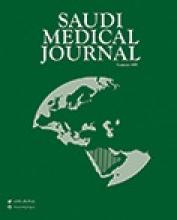Abstract
OBJECTIVE: To understand the impact of salt intake on blood pressure and to assess the application of international management guidelines in Saudi diabetic hypertensive patients.
METHODS: We recruited 112 consecutive diabetic hypertensive patients visiting the diabetic and nephrology clinic at the King Khalid University Hospital between July 2005 and January 2006. Participants received complete medical assessment and their 24 hours urine sodium was measured. Patients on diuretics were excluded from the study.
RESULTS: A significant correlation between 24 hours urine sodium and diastolic blood pressure concentration was observed (r = 0.25, p=0.04) but not with systolic blood pressure (r =0.06, p=0.6) or 24 hours urine protein (r =0.06, p=0.63). Approximately 15% of the patients had an glycosylated hemoglobin (A1C) of between 7-8% while 41.2% had an A1C of >8 (suboptimal group for glycemic control). Low-density lipoprotein (LDL) cholesterol in only 37.5% of the patients was within the desired goal (<2.4 mmol/l). Whereas only 24.8% of the patients achieved the goal of systolic and diastolic BP of <130/80 mm Hg.
CONCLUSION: Modest salt restriction has possible adjuvant effect to pharmacologic treatment to enhance blood pressure control. However, a majority of the Saudi diabetic patients with hypertension and hyperlipidemia are inadequately treated.
- Copyright: © Saudi Medical Journal
This is an open-access article distributed under the terms of the Creative Commons Attribution-Noncommercial-Share Alike 3.0 Unported, which permits unrestricted use, distribution, and reproduction in any medium, provided the original work is properly cited.






